Search alphabetically (by title):
- ALL
- #
- 0
- 1
- 2
- 3
- 4
- 5
- 6
- 7
- 8
- 9
- A
- B
- C
- D
- E
- F
- G
- H
- I
- J
- K
- L
- M
- N
- O
- P
- Q
- R
- S
- T
- U
- V
- W
- X
- Y
- Z
Titles
John F. Marszalek
|
Filed under: Civil War Era
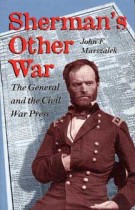
Marszalek traces the roots of Sherman’s hostility toward the press and details his attempts to muzzle reporters during the Civil War, culminating in Sherman’s exclusion of all reporters from his famous March to the Sea. Despite the passage of over a century, the question of press rights in wartime situations is very much today what it was during the Civil War. Marszalek finds a recurring movement toward repression of the press, with Sherman’s attitudes and practices only one of the most obvious examples. He also finds that press rights during wartime have often been governed by reactions to specific circumstances rather than treated as a constitutional issue.
Filed under: Civil War Era
Jan Cigliano
|
Filed under: Architecture & Urban Renewal, Regional Interest
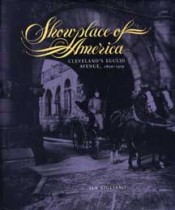
Euclid Avenue, which runs through the heart of downtown Cleveland, was for 60 years one of the finest residential streets of any city in 19th century America. Showplace of America is the fascinating account of the rise and fall of this elegant promenade, including portrayals of the eminent architects who created its opulent residences and colorful details about the lives of the wealthy people who occupied them.
Filed under: Architecture & Urban Renewal, Regional Interest
John Vacha
|
Filed under: Cleveland Theater, Regional Interest, Theater Studies
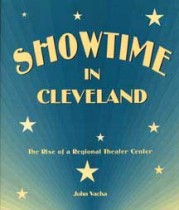
This work takes the reader from the city’s first professional theatrical presentation in 1820, through the heyday of vaudeville, to the grand reopening of the newly renovated Allen Theater in 1999 and the return of touring Broadway shows to Cleveland. In 1820 Cleveland was able to draw a visit from a troupe of professional actors. With no theater in which to perform, the troupe made do with Mowrey’s Tavern on Public Square.
Filed under: Cleveland Theater, Regional Interest, Theater Studies
Mark W. Weber and Stephen H. Paschen
|
Filed under: Biography, History, Regional Interest
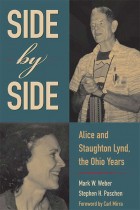
Quakers Alice and Staughton Lynd worked in Central America and Israel, where they championed the rights of Palestinian Arabs living in the West Bank. They took up the cause of prisoners’ rights following the April 1993 Lucasville, Ohio, prison uprising—the longest such rebellion in American history—working to improve the living conditions of the five inmates who were convicted of leading the rebellion. Together with Jules Lobel of the Center for Constitutional Rights, the Lynds filed suit on behalf of death row inmates who were kept in solitary confinement in Ohio’s prisons. Their lawsuit contributed to a landmark decision that improved living conditions for inmates in solitary confinement and established that prisoners have due process rights that have to be observed before they can be sent to solitary confinement.
Filed under: Biography, History, Regional Interest
Victor R. Greene
|
Filed under: History
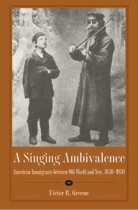
A Singing Ambivalence is a comprehensive examination of the ways in which nine immigrant groups—Irish, Germans, Scandinavians, Eastern European Jews, Italians, Poles, Hungarians, Chinese, and Mexicans—responded to their new lives in the United States through music. Each group’s songs reveal an abiding concern over leaving their loved ones and homeland and an anxiety about adjusting to a new society. But accompanying these disturbing feelings was an excitement about the possibilities of becoming wealthy and about looking forward to a democratic and free society.
Filed under: History
Kathleen Fernandez
|
Filed under: Regional Interest
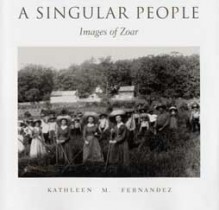
There is an unusually rich photographic record of the community and its people as well as many descriptions and comments by writers who wished to share their impressions of the Old World town. Today a restored village with a ten-museum complex operated by the Ohio Historical Society, Zoar has consciously maintained its German roots. Zoar continues to attract the curious individual, the traveler, the day-tripper, and the magazine and newspaper writers of the day.
Filed under: Regional Interest
Farnaz Fatemi
|
Filed under: Books, Poetry, Recent Releases, Wick First Book

The poems in Sister Tongue explore negative spaces—the distance between twin sisters, between lovers, between Farsi and English, between the poet’s upbringing in California and her family in Iran. This space between vibrates with loss and longing, arcing with tension. Farnaz Fatemi’s poetry delves into the intricacies of the relational space between people, the depth of ancestral roots, and the visceral memories that shimmer beyond the reach of words.
Filed under: Books, Poetry, Recent Releases, Wick First Book
George R. Dekle Sr.
|
Filed under: Audiobooks, Award Winners, True Crime, True Crime History
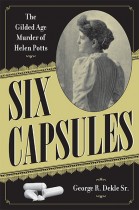
As Ted Bundy was to the 20th century, so Carlyle Harris was to the 19th. Harris was a charismatic, handsome young medical student with an insatiable appetite for sex. His trail of debauched women ended with Helen Potts, a beautiful young woman of wealth and privilege who was determined to keep herself pure for marriage. Unable to conquer her by other means, Harris talked her into a secret marriage under assumed names, and when threatened with exposure, he poisoned her.
Filed under: Audiobooks, Award Winners, True Crime, True Crime History
Aaron Astor and Thomas C. Buchanan
|
Filed under: Civil War Era, History, Interpreting American History
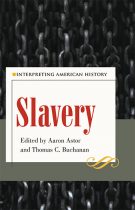
To fully understand the various ways in which slavery has been depicted and described is a difficult task. Like any other important historical issue, this requires a thorough grasp of the underlying history, methodological developments over time, and the contemporary politics and culture of historians’ own times. And the case of slavery is further complicated, of course, by changes in the legal and political status of African Americans in the 20th and 21st centuries.
Filed under: Civil War Era, History, Interpreting American History
Robert Brown
|
Filed under: Poetry, Wick Chapbook
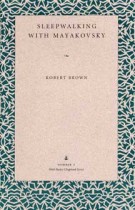
Sleepwalking with Mayakovsky is a collection of poems that explores the relationship between chaos and order. “Robert Brown extends a tradition that unites reasons and passion, form and wit, history and memory. These often wry and always thoughtful poems are less acts than dances of the mind, as elegant as they are intelligent.”—William Greenway
Filed under: Poetry, Wick Chapbook
Subject/Title category archive











